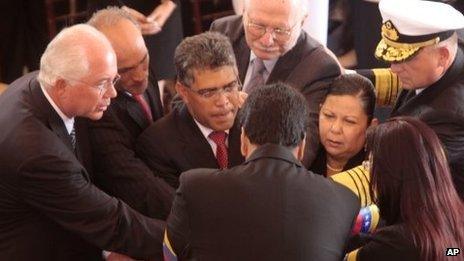Venezuela to investigate Chavez murder allegations
- Published

Oil Minister Rafael Ramirez (L) has said a special commission will investigate the death of Hugo Chavez
Venezuelan officials have said they will set up an inquiry to investigate suspicions that President Hugo Chavez was murdered by foreign agencies.
Oil Minister Rafael Ramirez told the BBC the United States and Israel were to blame for Mr Chavez's death.
He said he hoped the special commission would provide evidence.
Mr Chavez himself suggested he might have been injected by "foreign imperialist forces" after discovering he had cancer in 2011.
On an interview with BBC Mundo in Caracas, Mr Ramirez said he had no doubt that Mr Chavez's death was an act of confrontation and similar to Yasser Arafat's.
On the day Mr Chavez died, the Vice-President Nicolas Maduro also likened his case to the death of the Palestinian leader.
'Destabilise Venezuela'
Venezuelan official rhetoric against the United States has stepped up since last Tuesday.
Hours before announcing the death of the leader, Mr Maduro said live on state television that a plot to "destabilise Venezuela" had been foiled.
He also said two US military attaches were being ordered out, accusing them of involvement in the alleged conspiracy.
Mr Maduro said that one day a scientific commission would prove that Mr Chavez's cancer had been "injected by imperialist forces".
On Monday, the US expelled two Venezuelan diplomats following the expulsion of their officials from Caracas.
The second secretary in Venezuela's Washington embassy, Orlando Jose Montanez, and New York consular official Victor Camacaro were declared personae non gratae on Saturday and left the US on Sunday, state department spokeswoman Victoria Nuland said.
"When you have an incident that you consider unjust... you need to take reciprocal action and make your point clear," she added.
The Venezuelans were asked to leave a day after President Chavez's funeral, US officials said.
The two countries have not had ambassadors in each other's capitals since 2010.
- Published11 March 2013
- Published11 March 2013